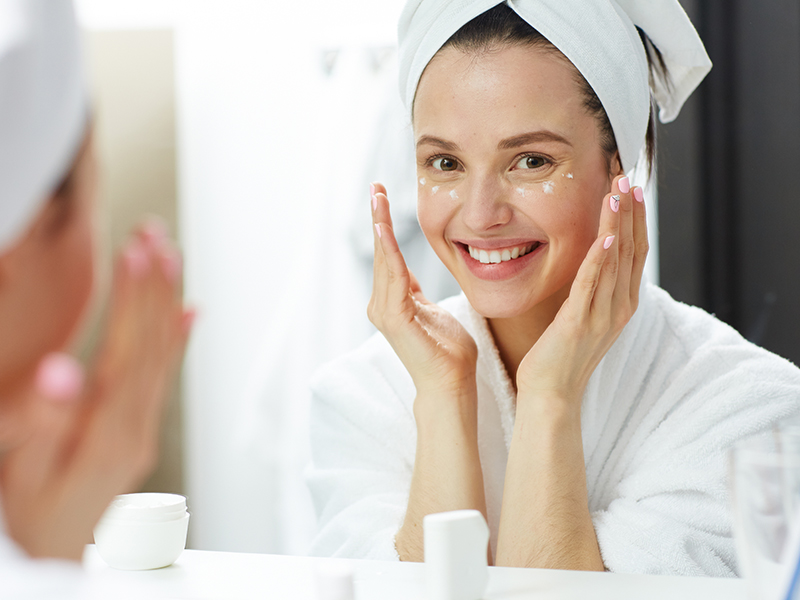Discover the secrets to achieving radiant and healthy skin naturally. Learn the importance of skincare, personalized routines, and effective tips for glowing skin. Explore topics such as cleansing, hydration, sun protection, and stress management. Enhance your skincare journey with expert insights.
Introduction
In our fast-paced lives, taking care of our skin often falls to the wayside. However, maintaining healthy and glowing skin is not only about aesthetics, but also an essential part of overall well-being. This article delves into the world of skincare, providing you with practical tips and insights to achieve radiant skin naturally.
Unlock the path to naturally glowing and vibrant skin with our comprehensive guide to skincare. Explore the significance of tailored routines, skin type awareness, and expert tips for a radiant complexion. Dive into topics like cleansing, nourishment, UV protection, and stress management to elevate your skincare game. Embark on a journey towards healthier skin today.
Skincare refers to the practice of caring for the skin to maintain its health, appearance, and overall well-being. It involves a range of activities, products, and routines aimed at cleansing, moisturizing, protecting, and treating the skin to promote a clear, smooth, and radiant complexion. Skincare encompasses various steps tailored to individual skin types and concerns, emphasizing the importance of proper cleansing, hydration, sun protection, and addressing specific skin issues.
Glowing Skin refers to a complexion that exhibits a natural radiance, luminosity, and vitality. Skin that is considered “glowing” appears healthy, well-hydrated, and free from dullness or uneven tone. This desirable quality is often achieved through a combination of proper skincare practices, a balanced lifestyle, and the use of suitable products that promote skin health and enhance its appearance.

Table of Contents
- Understanding the Importance of Skincare
- Know Your Skin Type for Effective Care
- Building a Daily Skincare Routine
- Cleansing: The Foundation of Healthy Skin
- Exfoliation: Revealing Your Skin’s Natural Radiance
- Nourishing Your Skin with Proper Hydration
- The Power of Serums and Treatments
- Sun Protection: Shielding Your Skin from Harmful UV Rays
- Embracing a Balanced Diet for Skin Health
- Beauty Sleep: How Sleep Impacts Your Skin
- Stress Management: Minimizing Its Effects on Your Skin
- Natural Remedies for Common Skin Issues
- Incorporating Exercise for Skin Circulation
- The Do’s and Don’ts of Skincare
- Conclusion: Your Journey to Healthy, Glowing Skin
Understanding the Importance of Skincare
Your skin is the largest organ of your body and serves as a protective barrier against external elements. Proper skincare helps maintain this barrier, prevent skin issues, and enhance your complexion.
Know Your Skin Type for Effective Care
Identifying your skin type is crucial for selecting the right skincare products. Whether you have oily, dry, combination, or sensitive skin, tailoring your routine to your skin’s unique needs is essential.
Building a Daily Skincare Routine
Creating a consistent skincare routine forms the foundation of healthy skin. Your routine should include cleansing, toning, moisturizing, and protection from the sun.
Cleansing: The Foundation of Healthy Skin
Cleansing removes dirt, oil, and pollutants that accumulate on your skin throughout the day. Use a gentle cleanser suitable for your skin type to avoid overstripping natural oils.
Exfoliation: Revealing Your Skin’s Natural Radiance
Regular exfoliation removes dead skin cells, promoting cell turnover and revealing fresh, glowing skin. Choose exfoliants with ingredients like salicylic acid or gentle scrubs.
Nourishing Your Skin with Proper Hydration
Hydration is key to maintaining plump and youthful skin. Apply a hydrating moisturizer after cleansing to lock in moisture and keep your skin supple.
The Power of Serums and Treatments
Serums are concentrated formulations packed with active ingredients that target specific skin concerns. Whether it’s reducing wrinkles, brightening dark spots, or boosting collagen, serums can be a game-changer in your routine.
Sun Protection: Shielding Your Skin from Harmful UV Rays
UV rays can cause premature aging and increase the risk of skin cancer. Always wear a broad-spectrum sunscreen with at least SPF 30 to protect your skin from sun damage.
Embracing a Balanced Diet for Skin Health
What you eat reflects on your skin. A diet rich in antioxidants, vitamins, and minerals promotes skin health. Include fruits, vegetables, lean proteins, and healthy fats for optimal results.
Beauty Sleep: How Sleep Impacts Your Skin
Quality sleep allows your skin to repair and regenerate. Lack of sleep can lead to dullness, dark circles, and breakouts. Aim for 7-9 hours of restful sleep each night.
Stress Management: Minimizing Its Effects on Your Skin
Stress can wreak havoc on your skin, leading to breakouts and inflammation. Practice relaxation techniques like meditation, deep breathing, and yoga to keep stress levels in check.
Natural Remedies for Common Skin Issues
From acne to dryness, nature offers various remedies. Aloe vera, tea tree oil, and honey have natural antibacterial and healing properties that can address common skin concerns.
Incorporating Exercise for Skin Circulation
Regular physical activity improves blood circulation, nourishing your skin with oxygen and nutrients. It also promotes a healthy complexion and radiant glow.
The Do’s and Don’ts of Skincare
- Do: Patch test new products
- Don’t: Overwash your face
- Do: Stay hydrated
- Don’t: Skip sunscreen
- Do: Remove makeup before bed
- Don’t: Pick at blemishes
Conclusion: Your Journey to Healthy, Glowing Skin
Prioritizing skincare is an investment in your long-term well-being. By following a tailored routine and making conscious lifestyle choices, you can achieve the glowing, healthy skin you deserve.

FAQs (Frequently Asked Questions)
- Q: Can I skip moisturizer if I have oily skin?
- A: No, moisturizer is essential for all skin types, including oily skin. Opt for oil-free, lightweight moisturizers.
- Q: How often should I exfoliate my skin?
- A: Exfoliate 2-3 times a week, depending on your skin’s sensitivity. Avoid over-exfoliating, as it can cause irritation.
- Q: Is natural sunscreen as effective as chemical sunscreen?
- A: Natural sunscreens provide effective protection, but they might need more frequent reapplication. Choose one that suits your preferences.
- Q: Can stress really affect my skin’s appearance?
- A: Yes, stress can trigger inflammation and worsen skin conditions like acne and eczema. Managing stress is crucial for skin health.
- Q: Are expensive skincare products always better?
- A: Not necessarily. The effectiveness of a product depends on its ingredients and your skin’s needs, rather than its price tag.